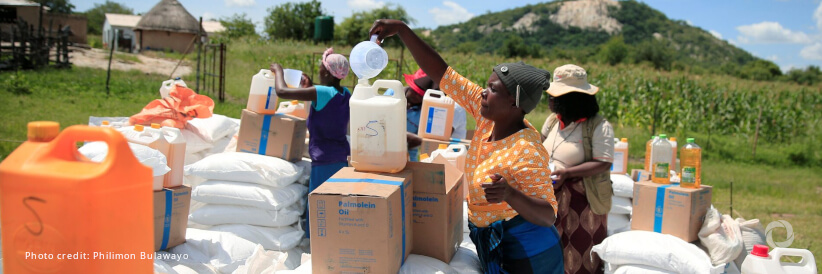The United Nations World Food Programme (WFP) and the United Nations Population Fund (UNFPA) signed a Memorandum of Understanding (MOU) to formalise their collaboration on integrating food and nutrition assistance with sexual and reproductive health rights (SRHR) and gender-based violence (GBV) services in Zimbabwe.
The memorandum aims to strengthen a shared commitment to break the cycle of poverty and inequality in Zimbabwe by focusing on food-insecure districts across the country, leveraging on WFP’s distribution networks and UNFPA’s health expertise. WFP will provide logistics and distribution platforms for UNFPA’s SRHR/GBV services, including family planning and maternal health care at food distribution points, enabling efficient use of resources.
“No woman should choose between feeding her family and accessing life-saving sexual reproductive health and rights services,” said Ms Miranda Tabifor, UNFPA Representative in Zimbabwe. “Empowering women and girls is central to breaking the cycle of poverty. This collaboration ensures they have access to both the food they need to survive and critical sexual and reproductive health and GBV services they need to thrive.”
WFP food distribution points are conveniently situated near vulnerable populations, ensuring accessibility and community engagement, making it easier and more convenient for communities to access essential and lifesaving SRHR services.
“Food insecurity and health are deeply intertwined,” said Barbara Clemens, WFP Country Representative and Director in Zimbabwe. “By integrating SRHR and GBV services into food distributions, we are not just saving lives, we’re empowering women and girls, which is the essence of sustainable development. This partnership is a blueprint for the UN’s ‘Delivering as One’ principle.”
The partnership supports Zimbabwe’s Ministry of Health, Ministry of Public Service, Labour and Social Welfare, Ministry of Women’s Affairs, and Zimbabwe National Family Planning Council in adopting a national integrated model. This model directly advances SDGs 2 (Zero Hunger), 3 (Good Health), and 5 (Gender Equality) through joint monitoring and reporting, contributing to the National Development Strategy 1.
The MoU comes with a solid foundation of successful collaboration between the two agencies in Zimbabwe. WFP and UNFPA have previously partnered to provide monthly food baskets (cereal, pulses, oil, and super cereal) to mothers at Maternity Waiting Homes, ensuring proper nutrition before childbirth. At the height of the COVID-19 pandemic, UNFPA innovated to maintain SRHR services through the WFP’s distribution networks.

